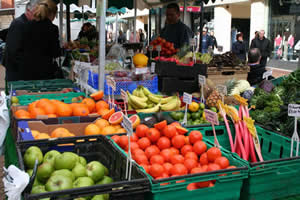 With health quickly becoming the dominant factor in young people's food choices, it's no surprise that West Lafayette's new campus grocery is called Fresh City Market. With health quickly becoming the dominant factor in young people's food choices, it's no surprise that West Lafayette's new campus grocery is called Fresh City Market.
Produce and snacks line the walls and aisles in dazzling arrays. Chefs and deli workers work diligently in a central island to make pasta salads, sandwiches and sushi rolls. The décor is funky and modern. In other words, it's everything you'd expect from a modern, student-friendly market.
But does Fresh City Market live up to its name?
"We want to get everything as local as possible. We try to keep everything within the community," said produce manager Jose Sotelo. "And we cook everything from scratch."
For Sotelo, fresh means local, and local means buying from a farm just over a mile away — at the Purdue Student Farm.
Fresh City Market, which opened. Aug. 11, aims to achieve a level of local sourcing that trumps even local farmers markets. Here, you can buy Purdue radishes, onions and peppers harvested just a few hours earlier. You can get cuts of meat from cows that were grown, butchered and packaged right here at Purdue, and they sell for the same price as commercial-industrial beef.
"Purdue's meat is actually a higher grade than (Certified) Angus Beef, but we keep it at the same price because we want to get the word out on local," said meat manager Matthew Moore. "We definitely want to carry more local products instead of getting things shipped from across the country."
Fresh City Market sells the same locally raised beef as the Boilermaker Butcher Block, both a functional university butcher shop and a resource for internships, education and research under the Purdue College of Agriculture's Animal Sciences department. But the shop is open only Wednesdays and Fridays from 2 to 5:30 p.m. Fresh City Market expands the Butcher Block's presence to Purdue and the Greater Lafayette community.
"Lots of local longtime residents come in and are excited to see we carry local products," said store manager Kevin Clark. "They want to see us keep the community going."
Head to the front of the produce section and you'll see a special table dedicated to vegetables grown at the Purdue Student Farm, located nearby at 1661 W. State St.
The small stand is easily dwarfed by the traditional produce aisle behind it, but Sotelo said he's planning to expand that selection. Buyers, he's noticed, care about locally sourced options.
"It sells real well here," he said.
On a recent Friday afternoon, the stand is almost empty. There's barely anything left in the wooden basket of Purdue beets, and there are only three Purdue zucchini left. Clark said he expects a shipment from the farm in a few hours.
Take a trip to the two-acre Purdue Student Farm and you'll see that the student workers put care into the growing process. Tomatoes are a standout — they're grown on tall, thick vines in greenhouses and out in the fields, and they're plucked fresh and transported to Fresh City Market every week.
"We want to build a community of students interested in local foods and small farms," said farm organizer Steve Hallett, walking through rows of kale and lettuce and speaking over the sound of clucking chickens.
He heads back to a white wooden house dubbed the "farmhouse," where a small team of student farmers are enjoying a late lunch of roasted peppers and onions.
Summer intern Laura Johnson, an agricultural engineering student at Purdue, stands up to show off a few heirloom tomatoes right outside, which she said have a unique and exciting flavor compared to traditional store-bought tomatoes. Having a campus market selling produce from a campus farm means it's easier than ever to shop local, she said.
"It's a good outlet to let students, who didn't grow up with agriculture, to show them what it looks like to have a local organic farm," she said.
The farm is organic as in it does not use any pesticides or chemicals in the growing process. But doesn't technically have federal certification, which requires a complicated and arduous application. That doesn't stop the student workers from making its vegetables as natural and fresh as possible.
"All of our practices meet the national organic program," Johnson said. "We believe that is what the future of small farms should look like. If you want to be as eco-friendly as possible, this is as close as you can get to locally grown."
|